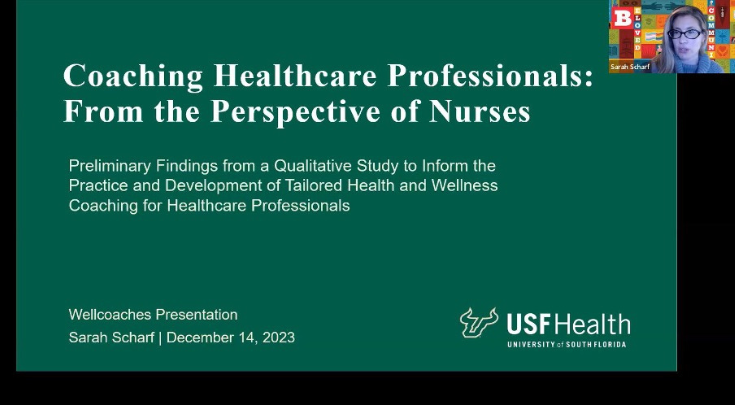USF College of Public Health DrPH student Sarah Scharf shared preliminary findings from her qualitative doctoral project during a virtual webinar hosted by Wellcoaches in December.
Wellcoaches is a global leader in teaching science-based coaching to health professionals enabling them to grow and thrive.
The webinar, Coaching Healthcare Professionals: From the Perspective of Nurses, was presented to 145 participants who tuned in from around the world.
“I have my certification in health and wellness coaching from Real Balance and USF,” said Scharf, who is concentrating in Advanced Practice Leadership. “Although I am not a nurse and have not provided direct care in many years, I currently oversee the strategic planning and leadership of community outreach and engagement for staff working to reduce the burden of cancer, specifically in underserved and underinsured populations. The health of our health care workforce is in crisis, and exploring innovation solutions such as health and wellness coaching is critical.”

DrPH student Sarah Scharf, pictured in upper right corner, delivering a Wellcoaches webinar. (Screenshot courtesy of Scharf)
In Scharf’s study, 85% of participants, all nursing students, said they had not utilized health and wellness coaching for either themselves or their patients. What’s more, only a few truly understood what health and wellness coaches do. (According to the National Board of Health and Wellness Coaching, health and wellness coaches “train in behavior change theories, motivational strategies and health education and promotion theories. They use these to support the client in creating and sustaining change for improved health and well-being.”)
Despite their lack of familiarity or utilization of health and wellness coaching, the vast majority of the study’s participants said they were ready or getting ready to take action toward improving their wellness. Most said they would prefer one-on-one coaching that was virtual and conducted by coaches who came from outside their health care organization.
“There is a need for modalities tailored to nursing professionals and other health care workers,” Scharf said. “Health care workers want to use health and wellness coaching if it meets their needs.”
Scharf, who currently works as the executive director of the Cancer Health Equity Center of Excellence at New Jersey’s Rutgers Cancer Institute, said the webinar was well received.
“It was a pleasure and honor taking part in the webinar,” Scharf said. “The post-event survey had a high completion rate, with valuable input, and more than 90% of those who had completed the survey noted they learned new coaching skills and/or information by participating in the class. Health and wellness coaching is gaining momentum in health care settings.”
